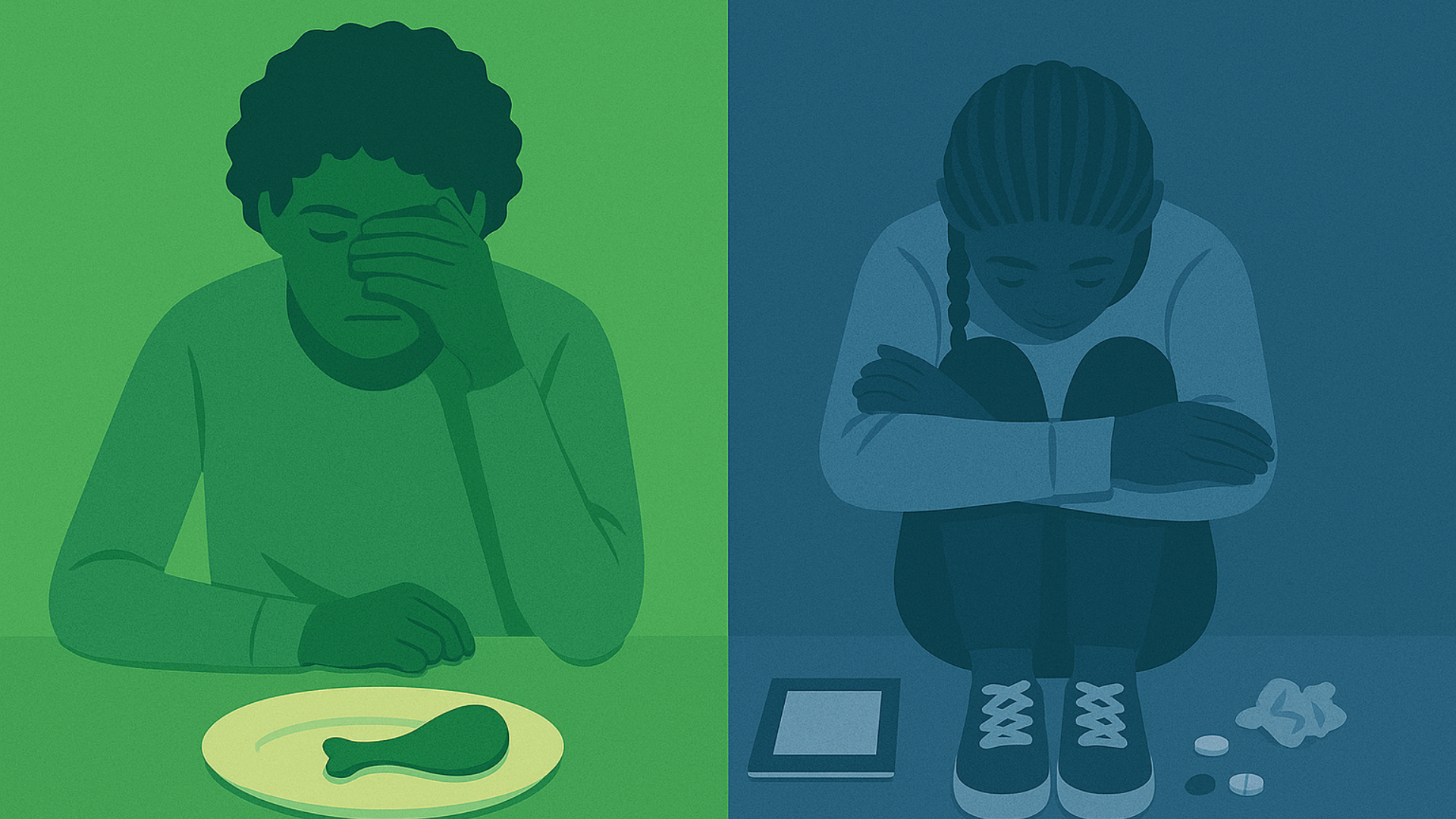Debunking Detox Diets and Embracing the Body’s Natural Cleansing Processes

By Thrive Wellness Reno Registered Dietitian Laura Oberg, RDN, RYT, MFA
Coinciding with the clean eating movement, “detoxes” or “cleanses” are diets that have garnered popularity as a way to reset and refresh the body after eating “bad” or “unhealthy” foods. Neither “good” nor “bad,” food is fuel for the body and mind, and these diets can be detrimental as they encourage disordered eating behaviors while also disrupting a person’s relationship with food and their body. Truthfully, the body is adept at removing waste products on its own. Thus cleanses seem to be yet another ploy by the diet industry to exploit the body image struggles that many experience while also providing a quick and costly “fix.”
WHAT ARE DETOX AND CLEANSE DIETS?
Detoxes are popular eating strategies that claim to eliminate unwanted food by-products in the body. They usually involve restricting solid food, drinking juices and other liquids, and sometimes using laxatives or other means of “cleansing the colon.”
The intentions of those who embark on cleanses vary. Some might be persuaded to believe that the diets give the digestive system a chance to rest and allow the body to deep-clean on a cellular level. Other common motivators include losing weight, increasing energy, and feeling healthier. Individuals may also be attracted to the short-term nature of a detox diet as they generally last only a few days, but typically promise fast results.
THE DOWNSIDES OF DETOX AND CLEANSE DIETS
Despite the alleged benefits, research shows that cleanses don’t actually result in toxin elimination or weight loss. Instead, detoxes often exclude vital nutrients from a person’s diet that are necessary for bodily processes and optimal functioning. For instance, drinking only juice can reduce an individual’s fiber intake, a substance that is required for healthy digestion. Additionally, cleanses can confuse individuals’ natural hunger and fullness cues, disrupting their ability to intuitively nourish their bodies in the most effective ways.
The harmful effects of detox and cleanse diets include:
- Cyclical fasting and binging: Detox diets promote a restrictive mentality that can lead to deprivation behavior. When this occurs, the mind believes that the body is deprived of adequate nourishment, and individuals are more likely to engage in overeating followed by compensatory food restriction, which can develop into a toxic cycle and even an eating disorder .
- Rebound effect and risk: Upon finishing a cleanse, a person can quickly regain any weight lost while dieting. Often this weight regathers around vital organs which heightens the risk for many chronic diseases.
- Slower metabolism or starvation response: When malnourished , the body attempts to conserve energy by slowing the metabolism and burning fewer calories. A severe starvation response can cause the body’s tissues to atrophy and organs to stop functioning properly, eventually resulting in death.
- Yo-yo dieting: The intense and quick nature of detoxes can be addicting to some, causing them to continually engage in rounds of cleanse diets followed by returns to normal eating patterns. With each change in eating patterns, a person can become increasingly disconnected from their body.
THE BODY’S NATURAL CLEANSING PROCESSES
Fortunately, the body already has natural cleansing processes in place. For instance, in the kidneys, toxins in the blood are filtered regularly. Toxin elimination also occurs in the liver where waste is prepared for excretion from the body.
Some healthy ways to promote natural cleansing and foster a sense of rejuvenation include:
- Eat intuitively : When you’re able, take time to prepare foods that you enjoy, eat enough food consistently according to your hunger and fullness cues, and choose foods from a variety of food groups.
- Plan a day of rest and self-care : Say no to requests for your time, keep your obligations minimal, and slow down. In doing so, you can give yourself a reset, reduce stress levels, and feel refreshed.
- Practice self-kindness: Speak to yourself kindly, so that negative self-talk doesn’t cloud your perspective. By treating yourself with self-compassion , you’re less likely to feel less stressed, anxious , and depressed . Instead, you’ll feel energized and ready to embrace life authentically.
- Prioritize sleep : Sleep has so many benefits to mental and physical health, including enhancing the body’s toxin elimination mechanisms. While sleeping, the liver works diligently to remove contaminants from the body.
- Stay hydrated: Water allows toxins to move out of the body through urination, sweat, and breathing.
- Engage in mindful movement : Physical activity reduces inflammation that can interfere with the body’s detoxification system. When choosing your movement activity, be sure it brings you joy and makes you feel good.
NUTRITION SUPPORT AT THRIVE
At Thrive Wellness, we empower clients to dismantle restrictive food rules and embrace gentle nutrition using intuitive eating principles . Through evidence-based nutrition counseling, our registered dietitians help clients understand their unique nourishment needs, establish personalized sustainable eating behaviors, and adopt a body positivity mentality based in self-love , so they can ultimately flourish. If you’re in need of support in overcoming harmful cultural conditioning and enhancing your relationship with food and your body, reach out to learn more about our nutrition counseling services.
About the Author
Thrive Wellness Reno Registered Dietitian Laura Oberg, RDN, RYT, MFA
With a bachelor’s of science in dietetics from Brigham Young University and having graduated from the Sodexo Dietetic Internship program in New York with honors, Laura Oberg built her career as a dietitian upon strong foundations. Early in her career, she provided critical care and pediatric nutrition services at both Jamaica Hospital in Queens, New York and St. Luke’s Hospital in Manhattan, New York. Later, her journey brought her to Intermountain Medical Center in Utah where she joined a nutrition support team with an exclusive concentration on parental and enteral nutrition (also known as tube feeding) for severely malnourished patients and those unable to obtain nutrition via traditional means. Along the way, Laura also spent time working as a care technician at a residential center for eating disorder recovery, where her passion for promoting holistic eating disorder healing grew stronger.
At Thrive Wellness Reno, Laura works with clients struggling with a variety of eating and feeding disorders. She finds the relationship each individual has with food and their body to be fascinating and encourages the concept of intuitive eating. As a registered yoga instructor, she also integrates mindful movement into her approach as she feels the mind-body connection that it offers can be extremely effective. She believes that together, nutrition and movement therapies can provide connection with and integration of the self.
Additionally, Laura has a master’s degree in fine arts from the School of Visual Arts in New York City with a focus on visual effects resulting from racism and generational trauma. She is captivated by artistic expressions of all kinds. When she’s not busy changing lives, she enjoys spending time at the lake, reading, playing with her kids, and taking road trips to her hometown of Vancouver, British Columbia, Canada.
The post Debunking Detox Diets and Embracing the Body’s Natural Cleansing Processes first appeared on Thrive Wellness.








